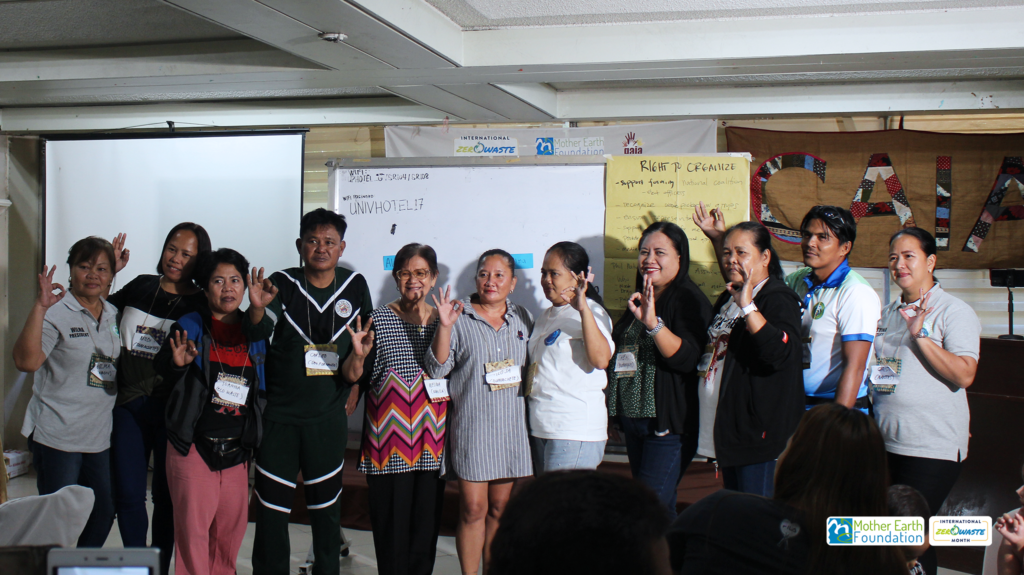In a significant move for labor rights and environmental justice, waste workers and waste pickers from diverse regions across the Philippines gathered in February 2024 for a national consultation, forming a national alliance and demanding a magna carta for Waste Workers. This marks a historic and unified call for the recognition of their rights.
From Manila to Siquijor, representatives of various waste picker and waste worker groups voiced concerns regarding their social conditions, ranging from job insecurity and exposure to health hazards to the imperative need for humane working conditions, better pay, health benefits and protection against discrimination. The delegates, representing over 1,000 waste workers and waste pickers from across the country, determined that despite their diversity, they have similar and resounding aspirations, all of them having faced a form of marginalization and discrimination in their line of work.
Following their emotional sharing of experiences and visions, Marina Cuyugan, treasurer of Women Waste Warrior (Manila), persuaded her colleagues to form a national alliance.
“Everything we discussed today will not become a reality if we don’t organize ourselves. We need to form a national organization. If we don’t, who will listen to us?” she told her fellow participants.
Thus, the establishment of the Philippine National Waste Workers Alliance, the first-ever national alliance of such kind in the country, as a unified front to advocate for their demands and their rights.
Aloja Santos, president of Dumaguete Women Waste Workers Association and founding president of the newly formed alliance, vowed to lobby for the adoption of a magna carta for waste workers embodying their demands and aspirations.
“If there is one thing we must accomplish, it is having a law that is grounded on our realities and responsive to our needs,” she said.
“We must be given social benefits and protection because we provide essential services to society. We are as deserving of such benefits and protection as any other worker. Perhaps even more so. Without us, society will not function efficiently. People just need to recognize our contributions to see that,” she added.
For Wilhelmina Magdaluyo, president of the Malabon-Navotas Waste Workers Association, benefits due to waste workers should not be subject to the whims of local politicians. “Many of our peers have been removed from work when there is a change of leadership after an election, despite doing hard work for more than 10 or 20 years. We need to ensure that every waste worker in the country gets the same protection,” she said.
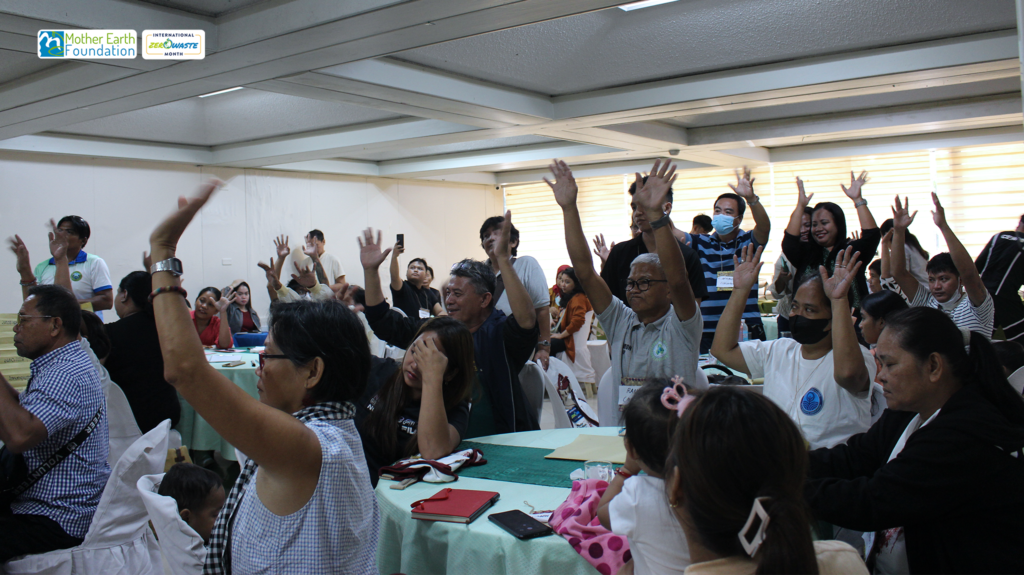
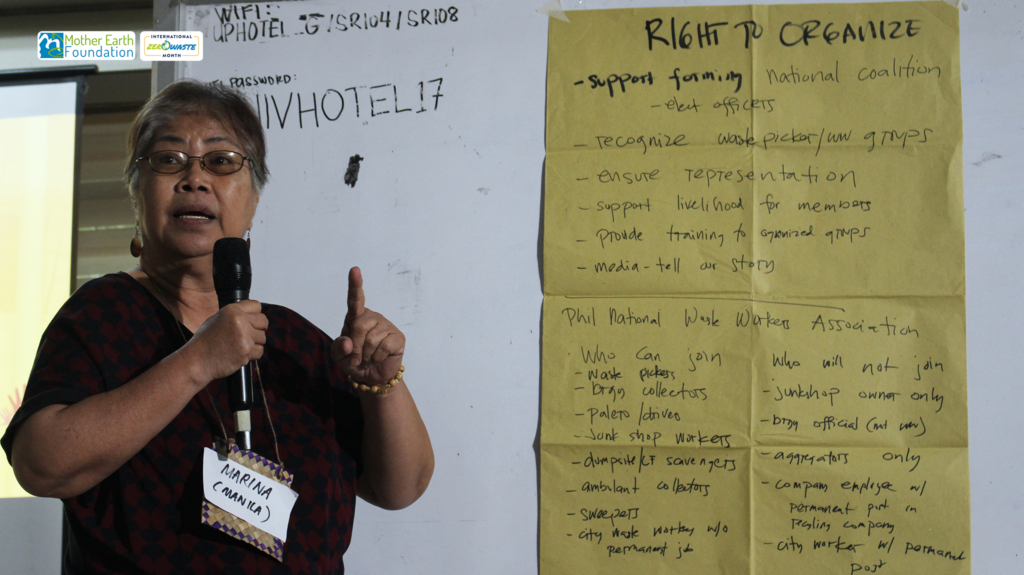
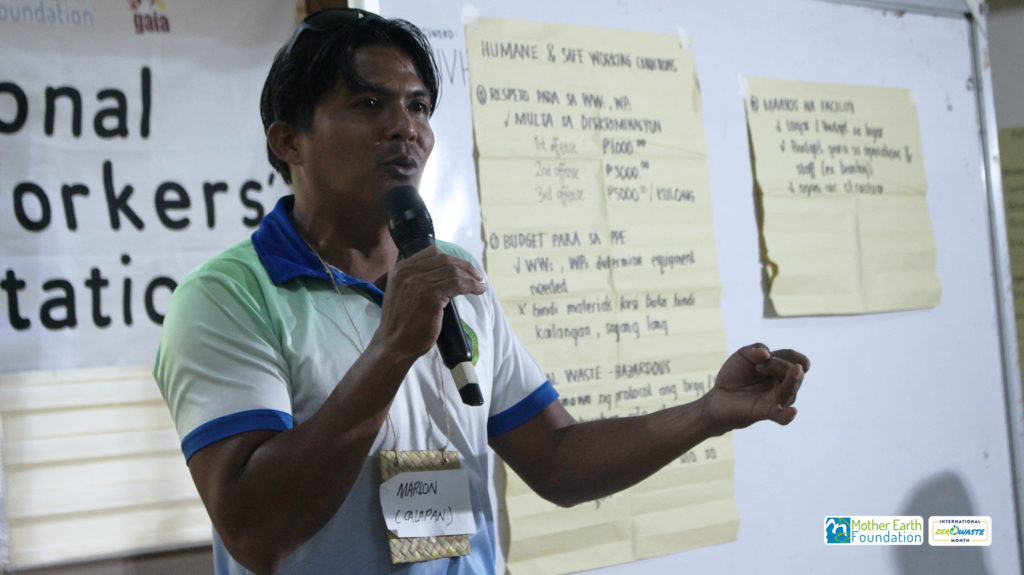
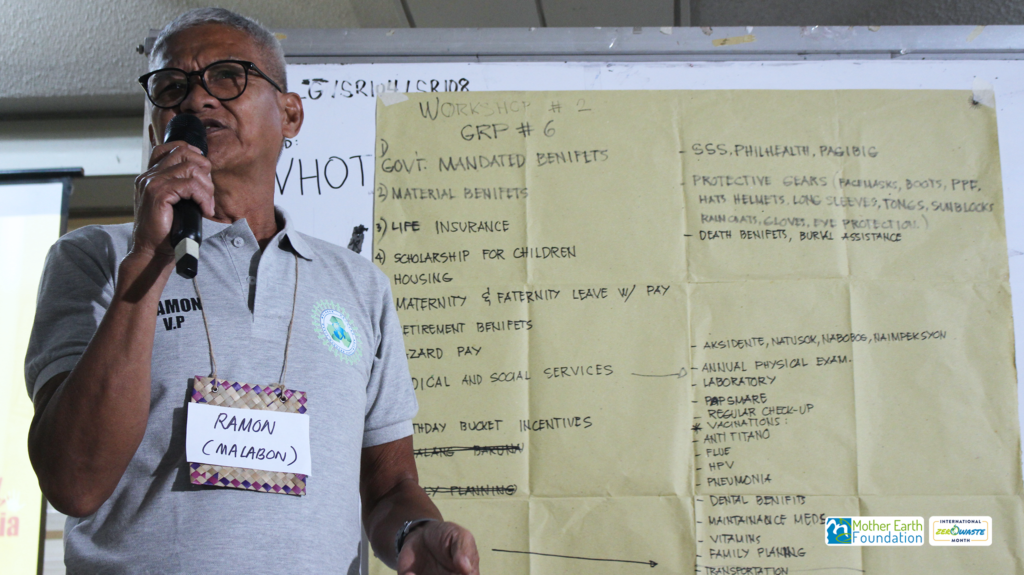
As a first step, the delegates formulated 10 demands which will be embodied in a draft magna carta that they plan to submit to the senate:
Enforcement of labor standards (pagpapatupad ng mga pamantayan ng trabaho). Enforcement of labor standards protects waste workers from being exploited, ensuring proper compensation and protection of rights.
Hazard pay (bayad sa panganib). Given the waste workers’ unsafe working conditions and exposure to health risks such as hazardous materials, the provision of hazard pay is a concrete demonstration of the recognition of waste workers’ rights.
Health insurance and services (seguro at serbisyong pangkalusugan). Access to health benefits and provision of essential medical care and support ensures waste workers’ safety and security.
Humane and safe working conditions (makatao at ligtas na kalagayan sa pagtatrabaho). The health and safety risks that waste workers face should be a thing of the past. It is imperative upon the government to ensure safe working conditions for all workers, especially those managing waste. Provision of personal protective equipment is just one of the basic actions that must be carried out to ensure waste workers’ safety.
Job security (seguridad sa trabaho). Waste workers lack job security. Many face the risk of layoffs or contract terminations, resulting in financial instability and economic vulnerability. Providing job security not only allows for financial stability and security but also promotes commitment and reliability in the long term.
Just compensation (tamang pasahod). Fair wages for waste workers not only ensure economic security, it also recognizes the essential role of waste workers in communities as frontliners.
Meaningful participation in policy spaces (makabuluhang pakikilahok sa mga espasyo ng patakaran). Waste workers have the experience and expertise that can meaningfully contribute to our communities’ waste management policies. Waste workers’ voices should be at the front and center of policy discussions for just, informed, and effective policies.
Right to organize (karapatang mag-organisa). The formation of the Philippine National Waste Workers Association (PNWWA) allows waste workers to have proper representation in policy spaces. An organized group is better equipped at advocating for basic rights and better working conditions. This also grants an opportunity for collective action and empowerment of waste workers in the Philippines.
Social benefits and protection (kapakinabangan at proteksyong panlipunan). Waste workers are among the most vulnerable sectors in society, facing security and health risks, economic instability, and even social discrimination. Access to social benefits and protection is critical in addressing these issues, allowing for dignified labor and more humane living conditions.
Training (pagsasanay). Since waste pickers and waste workers deal with hazardous materials, training for safe-handling is essential to ensure safe working conditions. Skills training will also be useful for work outside the waste sector.
Mother Earth Foundation chairman Sonia Mendoza lauded the waste workers for organizing themselves. ”Being an organized group provides them advantages such as collective bargaining power, better sectoral representation and recognition and access to capacity training,” she said.
She added, “MEF’s Zero Waste City models would not be successful without the hard work, commitment and dedication of waste workers. Yet the invaluable help of these unsung heroes in our Zero Waste work is often ignored and not given importance, especially by the government. The significant strides that the Zero Waste movement has achieved would not have been possible in the Philippines and around the world without waste workers.”
An organization actively engaged in addressing waste and toxic pollution, climate change and other health and environmental justice issues, MEF is best known for helping local government units in developing and implementing community Zero Waste programs. Many of the LGUs cited for their good waste management have partnered with MEF, among them San Fernando in Pampanga, Siquijor, and Batangas City in Batangas. They have worked directly with waste workers in program implementation, which resulted in improved living conditions for the waste workers.
Various estimates place the number of waste workers and waste pickers in the Philippines at over 100,000 under the informal waste sector, but waste worker groups and their partner NGOs believe this is a gross underestimation. Waste workers and waste pickers often work in open dumpsites and wander around cities collecting trash on-foot or with carts, thus their numbers are mostly unrecorded. And while considered essential workers, waste workers are underpaid and overworked, with only 4,000 (.04 percent) waste workers nationwide reported to receive annual wages at around P250,000 in materials recovery, waste collection, and waste treatment and disposal.
“We call on the government to ensure a just transition for informal workers in the waste sector by once and for all listening to their voices and immediately acting on improving their working and living conditions. The waste workers and waste pickers are not asking for far too much. All they are demanding is that they be accorded their fundamental rights as Filipinos, and as workers whose contributions greatly benefit society,” said Sherma Benosa, lead of the Just Transition work of Gaia Asia Pacific for waste workers and waste pickers.
A network of grassroots groups as well as national and regional alliances, Gaia aims to catalyze a global shift towards environmental justice by strengthening grassroots social movements that advance solutions to waste and pollution.
“They are not only the backbone of efficient resource and waste management, they also play a central role in climate change mitigation. If we are to succeed in our fight against plastic pollution and climate change, we need to support our frontliners — the waste workers and waste pickers,” she added.
